87 hours of GRE
The repeatable process to get the score you need.
This year I sat the GRE, and got the scores of Verbal 165 and Quantitative 167 on my second attempt. My decision to sit the GRE rather than the GMAT came from the fact that a course I was considering required the GRE, however the I believe this process applies as much to GMAT as GRE.
I wanted to write about my journey from my first score of 155//158 Verbal//Quantitative because I turned my study into a highly repeatable process. I felt the space was full of tips of how and what to study, but lacking processes to follow. I noticed this when asking my colleagues about their process and feeling a lot clearer on what to do and how to do it after speaking with them.
From my 87 hour journey my process boils down to two areas.
1. Remove the ambiguity. This allows you to focus only on optimising the output of your hours of study.
2. Get after the weakness. The GRE is not a strengths-based game. Optimising your study is about removing weaknesses. There is not a disproportionate reward for being really good at trigonometry, however you will be penalised for not being good at it.
Before I begin, I will not be focusing on the writing section (is it even called that? can’t remember). I got 4.5s with doing one practice essay. If I can do that, anyone can.
My Journey
Before we start, here is my journey. All up I dedicated 87 hours.
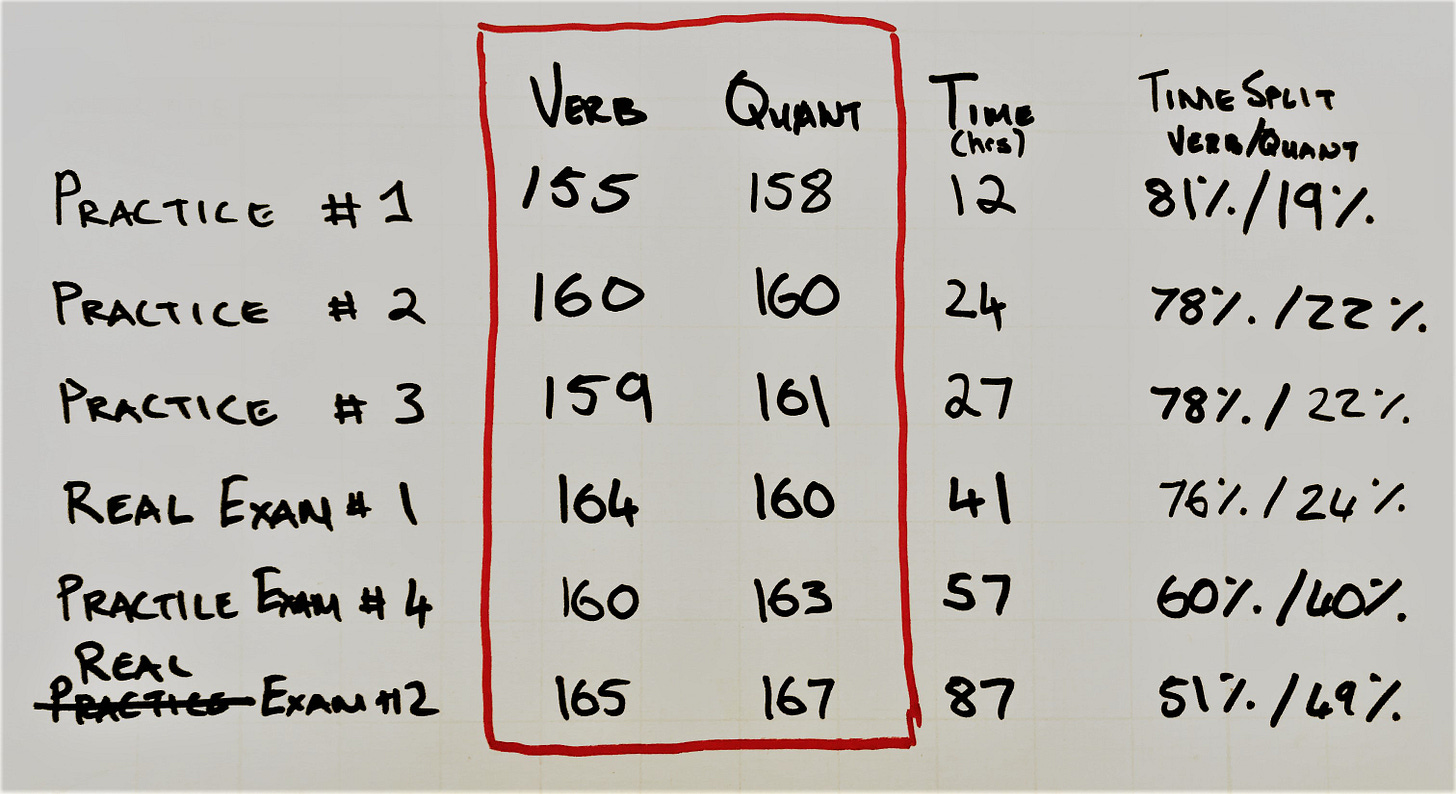
I ended up splitting my time almost pefectly 50:50 when it came to Verbal and Quant study. However most of my time (76%) was dedicated studying verbal up to my first real exam. After the shock of my Verbal score beating my quantitative score I switched to Quant study, with the intent of maintaining my Verbal score.
Other then a few blips here and there my progression across both fronts seemed to be quite steady and directly proportional to the hours I put into each section.
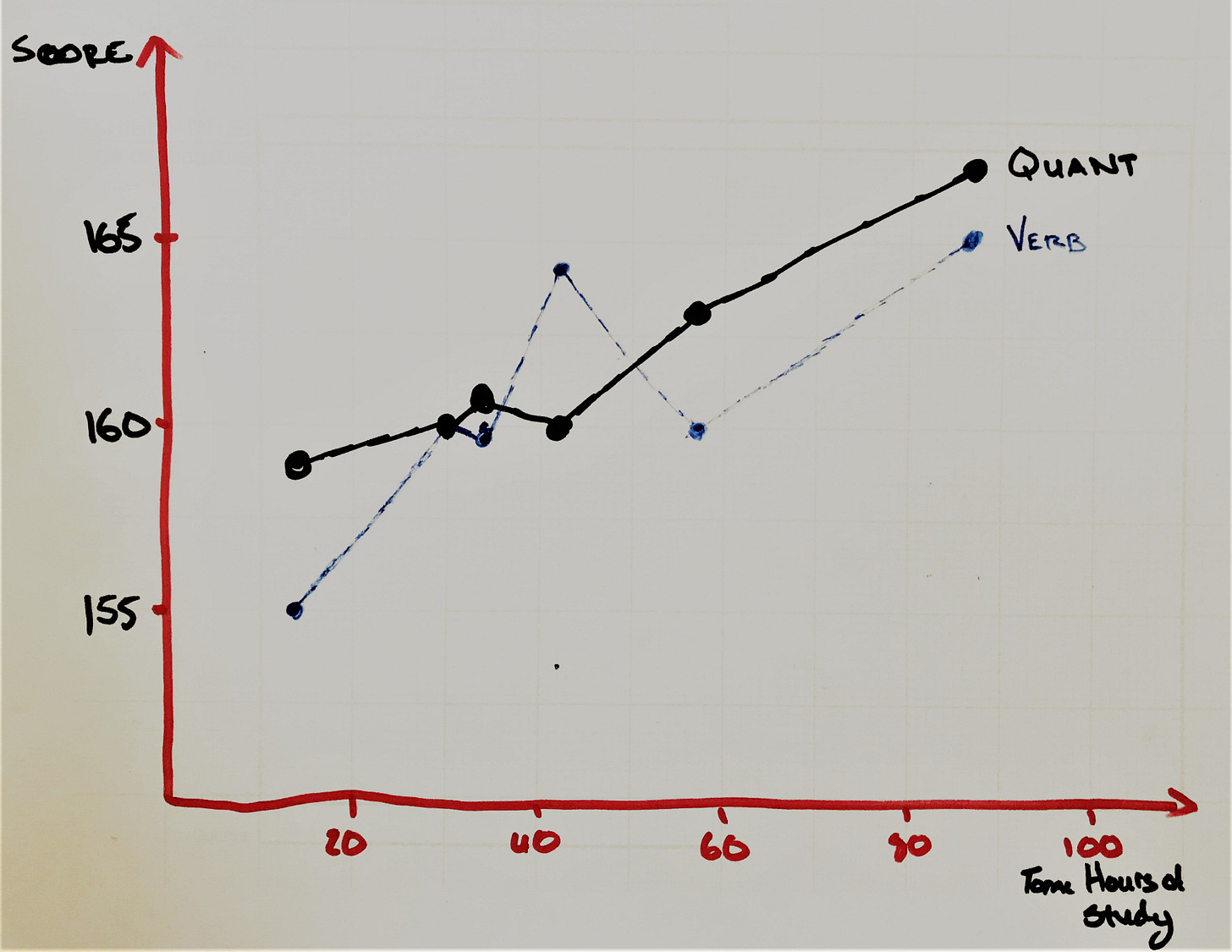
However digging into it I saw that my progress with my Quant study was very steady, yet my verbal received all the benefit during the first 20 hours of study (now that is diminishing returns).
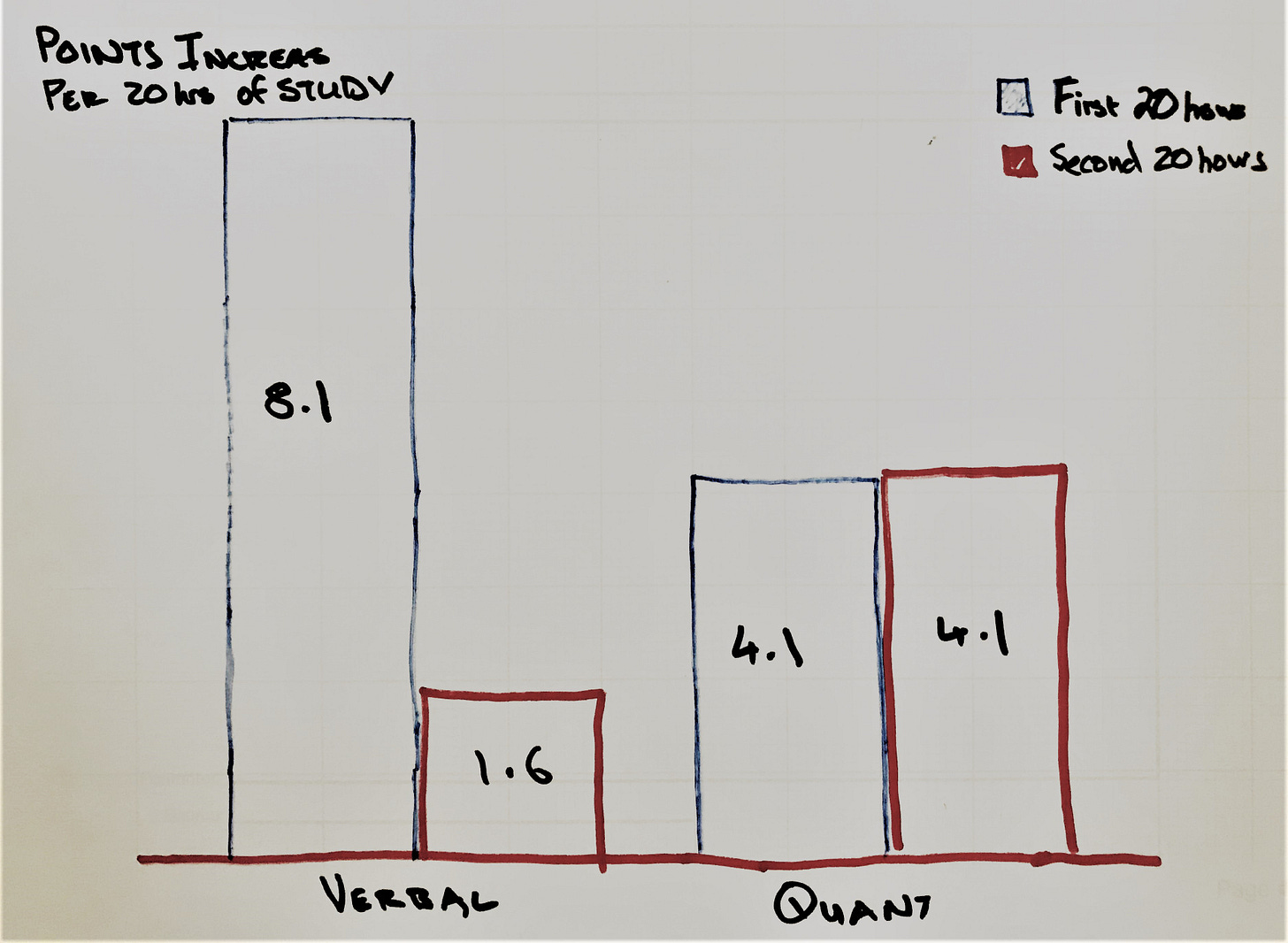
Overall my progression was on average ~5 points per 20 hours of study. From speaking to others this is fairly normal. This can be used to estimate how long it would take you to get a desired score. I had this in mind as I was studying and this really helped with my dedication. I knew if I put in, I would get returns.
Now onto my process.
Step 1 – Remove the ambiguity
There is only one thing you need to focus on and this is how effective you are at studying. The reason why you can do this is because there are only three other variables when attacking the GRE. All of these you determine the value of very quickly. Those are:
What score do you need?
I wanted ≥ 165 for both categories.How many hours will you be able to study for?
I budgeted 100 hours of study to get it done, 7-10 hours per week and with 14 weeks to study. This will be combination of when you need to sit the test by and how many hours per week you can dedicate.What is your baseline score — where are you starting from?
My first practice test scores were: Verbal: 155, Quantitative: 158
Once these are known quantities, all that is left is to focus on how effective your study hours are, and keep track.
Establishing your variables
I won't delve into what score you need (1) or how many hours you should study for (2) because these are often very personal to you. Usually you need a certain score and you need to apply by a certain time.
To establish your baseline don't simply sit a practice test straight away. Familiarise yourself with what this test is and how the questions look. I needed to learn how to do a test again (it has been ~6 years since university) and also to learn the format. To do this I completed about 10-20 questions of each question type and format. I used the Manhattan books for this. After about 12 hours of study. I sat my first test which got me the scores of 155 and 158. I was somewhat disappointed with this.
Step 2 - Get after the weakness
The GRE is a game that is rate-limited. Your overall outcome will only be as good as your weakest leg. You can't win by being really good at one aspect. You only win if you do well in a number of areas. You can get lucky and have a weak spot in a sub-topic that doesn't come up, but if you're not good at algebra or vocabulary, you will struggle to get the scores you need. That being said, there is physically too much to study so the trick is finding the most effective areas to focus on.
This focused me to finding my weaknesses and either eliminating them or allowing myself to better detect this was a weakness mid-exam so I did not waste precious time.
My first practice test showed me that not only was my verbal weaker, but my weakest area was Sentence Equivalence and Text Completion i.e. vocabulary. I also discovered that most of my Quant weakness was speed rather than a particular area. I knew this because of I had unanswered questions (unforgiveable) and my time spent on the final five questions was very low.
I decided to make vocabulary my focus between my first two practice exam. Focusing here saw quite a bump in my score. Adding an additional 5 points with ~13 hours of study. Where this improvement came from was my improved scores in the Sentence Equivalence and Text Completion areas.
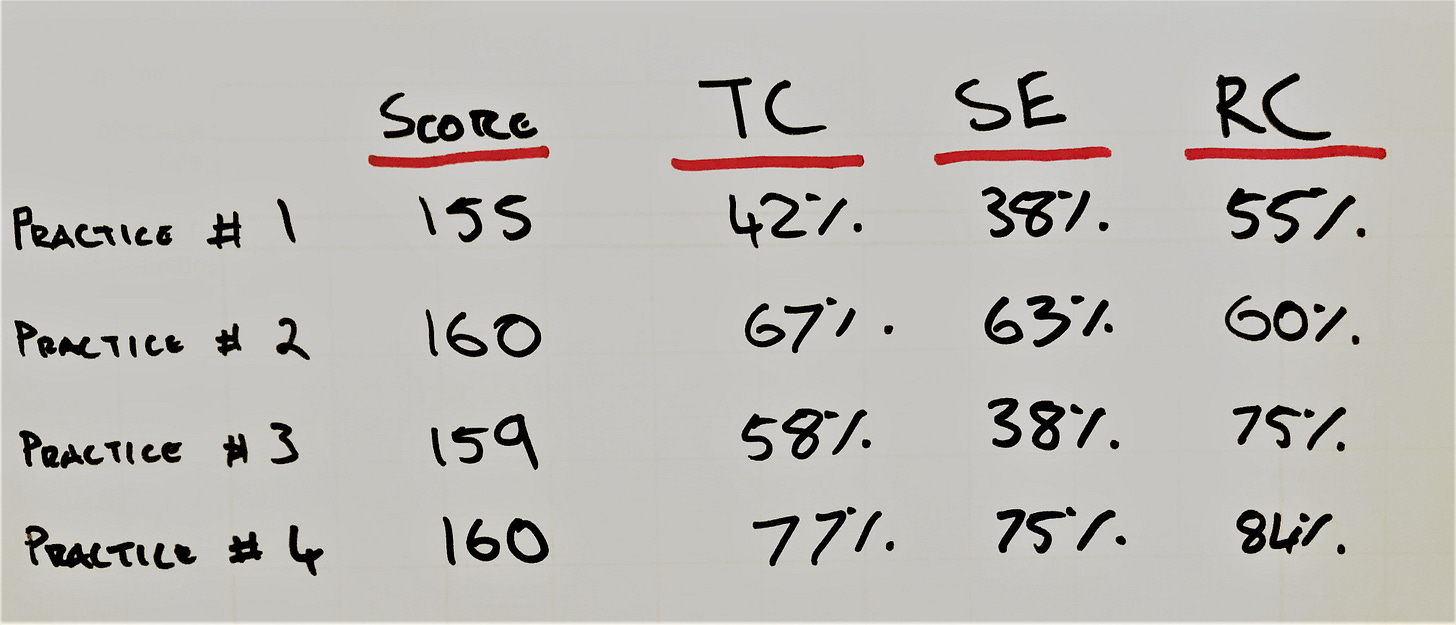
I continued this process of doing a practice exam, dedicating 80% of my study time to the area that I determined my greatest weakness. Consistently this was vocabulary (is peccadilloes even a word really?). As I churned through the words I not only learnt words but I became faster at identifying questions I would not get correct and would thus waste less time on them. I go into how I studied for vocbulary further below.
At the 40 hour mark I decided I wanted to sit a real exam and truly calibrate my scores (and also hopefully pull it out of the bag). This exposed a new weakness for me, my quantitative scores. This forced me to hone in on that for the final push. For this I was able to focus in a very specific set of topics to practice.
Across the practice exams I broke down the number of questions by topic, figured out my percentage correct and started digging into where I was bad. Taking an expected value approach I determined where I was expected to lose the amount of points. I then honed in on these areas in the order of highest expected loss value.
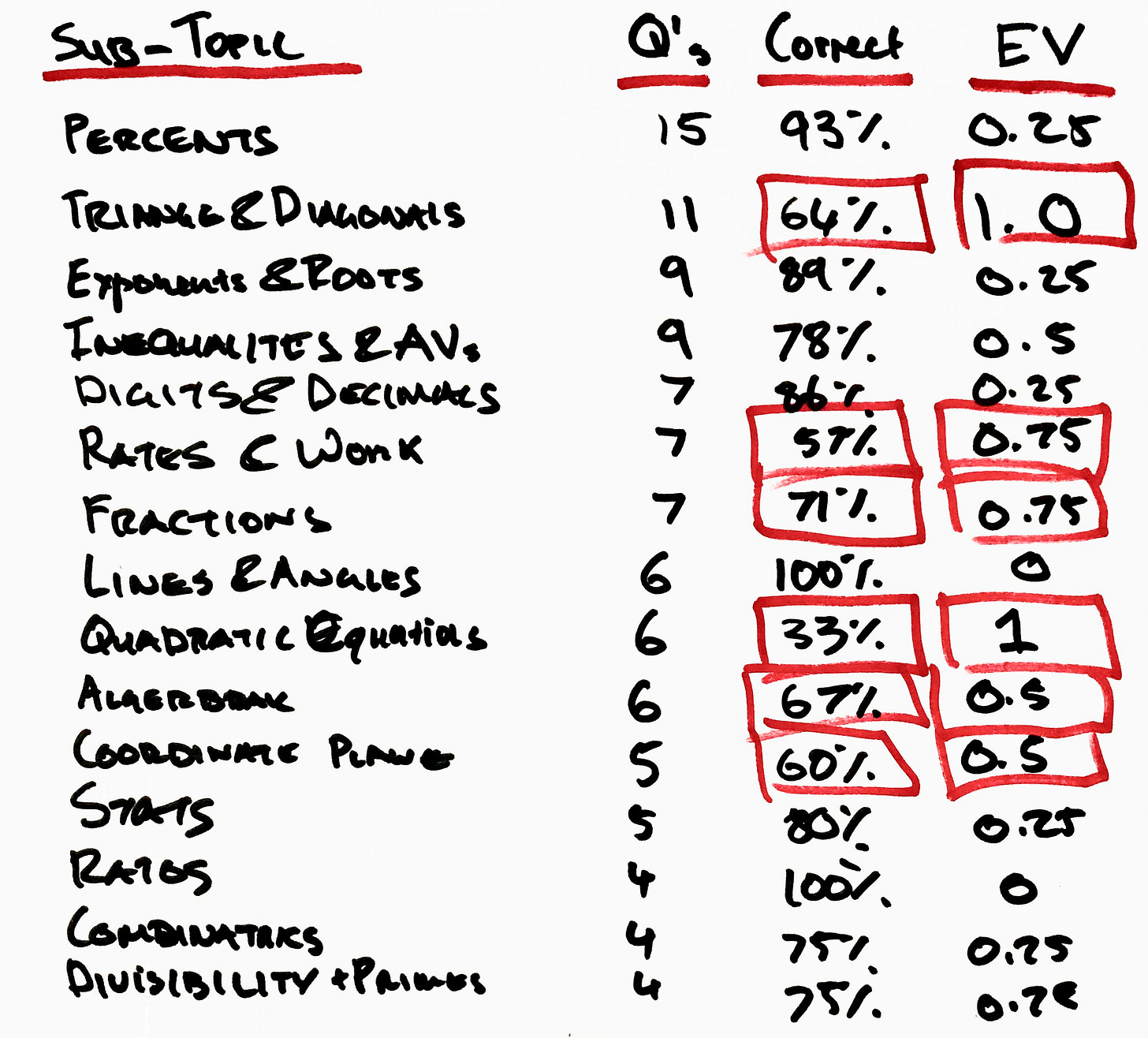
What you can learn from my experience
What I can say that worked really well (other than the above two steps) was keeping a detailed log that allowed me to go deep onto where I was spending my time. I was diligent but not crazy. I can tell you I spent about 30 hours on vocabulary, but I can’t tell you how much time I spent on triangles.
This detailed log allowed me to not waste anytime figuring out what to study. It gave me a clear plan. This then allowed me more time to experiment on format and timing of study (for example creating my own podcast of words).
An area that I haven’t touched on that wasn’t an issue for me was exam stamina. If you sturggle with long periods then sit the practice exams strictly to simulate real life experience.
Obviously this wasn't just the lovely, structured fairy tale that is written above. I would change some things if I had my time again. One of my mistakes is I didn't book my tests in, until I had two or three weeks to go. This meant that I let my 87 hours drag out over 9 months. If I had compressed this I think it would have needed less hours overall and resulted in less background stress and continual thoughts of "I should be studying".
The second mistake was to be in denial about my quantitative scores. I assumed they would lift with very minimal practice, and it wasn't the case. If I had put a few more hours of effort in, I might not have had to sit a second test. I was in denial that my quant scores were a weakness until after the first exam.
My final mistake was not realising the importance of time management during the exam. I was always ok on Vocab, but Quant I always struggled.
My final parting words of wisdom is that the GRE (and I assume the GMAT) is proportional to the dedicated time you put into it. Focus and you can get the score you need. If you would like my spreadsheet. Subscribe and I’ll send it to your email.
Studying for vocabulary
My process for this was simple. My goal was to never have to relearn a word, once I had learnt it. So my process was focused on retaining. I would:
Find a word I didn't know and add it to my list
Create a flashcard for this word. My flashcards contained: a definition, a pneumonic prompt if I could think of one, one or two synonyms, one or two antonyms and an example sentence. At first I did these on post it notes then moved to a tool like Quizlet. I also used the Magoosh GRE flashcards. They were pretty good.
This word would go in one batch which I would revisit ~1 day, 3 days and 7 days time. If I got this word right each time then it would go in the "learnt pile" which I would revisit every fortnight or so.
I would make my own podcast of 10-20 flashcards, I would listen to these on commutes or walking or something
Studying for quantitative
For this I predominantly used the GRE 5 lb. book of problems.
1. Identify a weak spot (as above)
2. Do 20 questions on the area
3. Do another 20 questions on the area in ~1 week. See if I improved. If I did, then I would consider it learn.
Resources I used
Manhattan Prep GRE Set of 8 Strategy Guides. I was given a second hand set of these.
The Manhattan 5 Lb. Book of GRE Problems
The Manhattan Prep practice exams that came with these books
Victor Prep Podcast this guy is great and just adorable. I would listen to him on double speed and walk away from each episode (10 mins -> ~3 mins) knowing four more words.
My own voice recordings of words. Used my iPhone’s audio recorder.
GRE Magoosh Flashcards
Bulk Excel

Found your approach helpful and relevant - please can you share the spreadsheet with me on placeholderforsubs@gmail.com? Thanks!
Congratulations on your great score! These tips are very helpful. I am doing well on quants, but struggling with verbal. Could you please share the spreadsheet with me on varry1892@gmail.com? Thank you again.